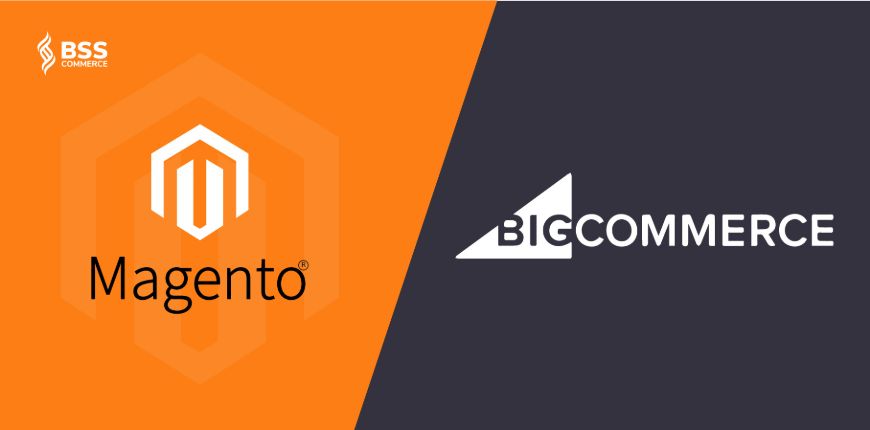Choosing between Magento vs BigCommerce has never been easy for online merchants. Both platforms are rich in features but do not share the same target users. A suitable platform allows store owners to make the best out of given tools and capabilities to create an optimized online store. Below are suggested points to decide which platform is right for your business.
First of all, let’s look through some highlights of each platform.
The Highlights of Magento vs BigCommerce
Table of Contents
Magento
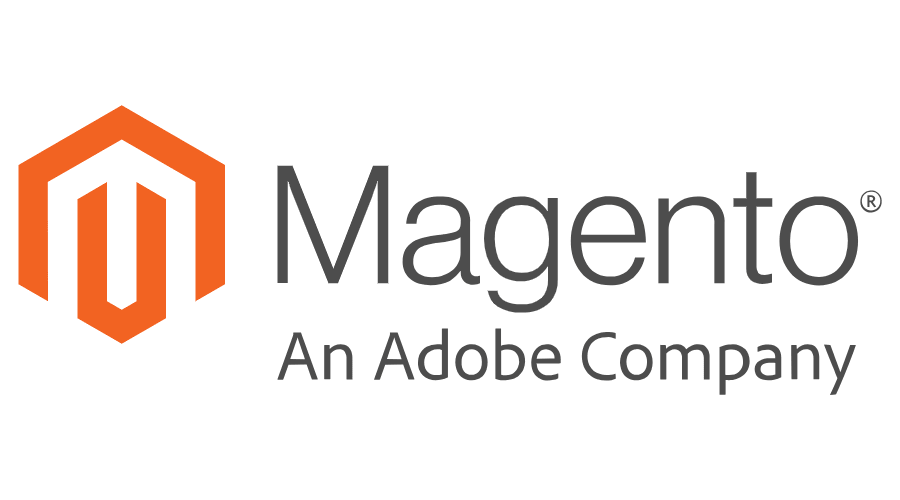
Magento is an open-source eCommerce platform written in PHP and based on Zend Framework. Released in 2008 by Varien, it has continuously been updated through many versions. Businesses can choose between 2 Magento editions: Magento Community vs Magento Enterprise. Magento Community (also called Magento Open Source) is free to use. Its code can be easily downloaded without any payment and customized by developers.
On the other hand, Magento Enterprise (also called Magento Commerce) offers 2 pricing plans. The premier plan is Magento Commerce Cloud, which combines both Magento Enterprise and hosting.
How popular is Magento? More than 198,000 live websites are using Magento. If we count the websites used to run on this platform, the number is much bigger (over 756,000). The platform is trusted by many world-class companies like Coca-Cola, Ford, Range Rover, etc. because of its robust features, great scalability, and huge support among the community.
Do you want to dig deeper into the Magento platform? Read this article below: What Is Magento Ecommerce and All You Need to Know About It
Bigcommerce
While Magento is a PaaS (Platform-as-a-service), BigCommerce is a SaaS (Software-as-a-Service). This means that it is a hosted platform. Bigcommerce and Shopify are leaders in SaaS eCommerce solutions. According to BuildWith’s data, around 51,383 live sites are using Bigcommerce. This is much smaller than the number of Magento users.
Other comparisons you might be interested in:
What makes the difference in the usage between Bigcommerce vs Magento 2? Don’t skip the following comparison.
Magento vs BigCommerce: The Close Battle
Hosting
BigCommerce is a hosted platform running on Google Cloud, so you don’t need to worry about seeking the right BigCommerce hosting provider. It goes similarly with downtime because BigCommerce has an average uptime of more than 99.99%. With BigCommerce hosting, you get faster page load time and spend less time maintaining your website.
Magento can be hosted on-site, in the cloud, or through a third party. With Magento Commerce Cloud, your website is fully hosted and run by Magento. If you choose Magento Open Source, you will have to purchase your domain and hosting. Please note that the Cloud edition is still based on the Platform-as-a-Service (PaaS) model.
Scalability
Magento 2 vs BigCommerce: Which platform is more scalable?
For businesses having a plan to expand in the future, scalability is not neglectable. This is because dealing with a high volume of traffic and sales is not easy but needs preparation. The scalability of an eCommerce solution decides if it can handle those things when businesses grow.

Magento is the most scalable platform, making it one of the ideal solutions for large-scale online stores. It allows smooth scale-up of catalogs and products in stores with a great inventory management system.
Unlike BigCommerce, Magento can easily process more orders per hour on the same hardware and deal with order volume strikes easily, delivering near-instant service response times for catalog browsing.
What about BigCommerce? If you decide to scale up with BigCommerce, you will need to move to higher plans.
Payment methods
Both Magento and BigCommerce support a diversity of payment gateways. However, when we compare Magento vs BigCommerce, Bigcommerce is the winner in terms of quantity. The platform supports more than 40 options, including PayPal, Stripe, Amazon Pay, Authorize.net, etc. However, it doesn’t support such payments as Swedbank, and SEB which are popular in many countries.
Magento offers fewer payment gateways. This is not a big drawback because it still integrates the most commonly used payment methods like PayPal, Braintree, or Authorize.Net. For wider needs, businesses can integrate more payment methods in several ways.
SEO & Marketing
Magento
Magento is one of the leading eCommerce solutions that supports a lot of handy SEO settings, which allow merchants to optimize their visibility on search engines. For more advanced functionality, merchants have many choices of third-party modules to integrate into their stores.
Default SEO settings in Magento 2 include:
- Metadata
- Personalized URL
- 301 Redirects
- Sitemap
- Canonical tag
- Google tool
Furthermore, Magento 2 has many improvements to SEO over Magento 1, including Auto-Generation and Schema.org features. Auto-Generation is used to set templates for product metadata and Schema.org could help your website rank higher on search engines.
>>> Read more for [2024 Update] Magento 2 Tutorial For Developers & Merchants
In terms of marketing, Magento supports excellent features built-in. Here are some setting sections you shouldn’t miss:
- Promotion: Cart Price Rules, Catalog Price Rules
- Communication: Email templates, Newsletter templates, Newsletter Queue, Newsletter Subscription
- Review monitoring
- Customer engagement
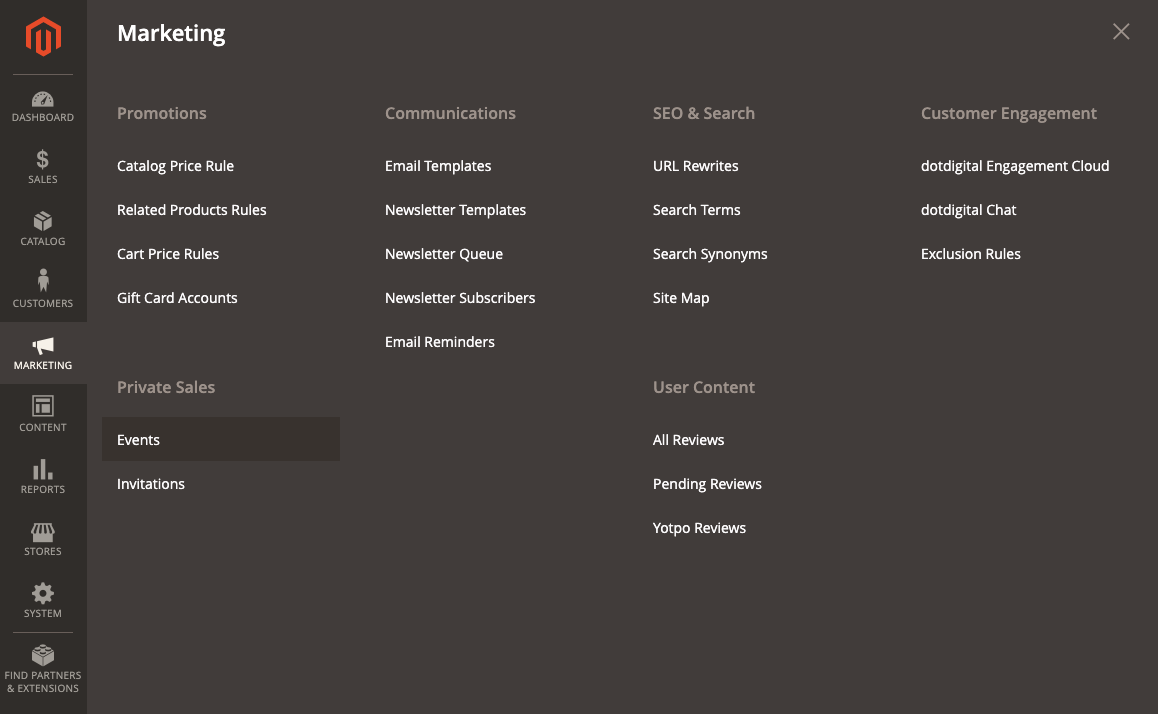
- (Marketing menu in Magento 2.4)
Especially, Magento Commerce Edition offers the next level of marketing with many more premium settings like Gift Registries, Private Sales & Events, Rewards & Loyalty, to Related Product Rules. These settings allow merchants to create diverse marketing actions customized to the right audience.
Bigcommerce
Besides basic SEO settings, BigCommerce comes with more advanced features like Microdata (Rich Snippets) which improve the appearance of websites on search engines in a more informative way, robots.txt, or Google sitemap. BigCommerce also allows merchants to access a program called Support SocialShop that enables you to post promotions on Facebook, Pinterest, and Twitter. However, BigCommerce is beaten by Magento with its huge set of marketing tools.
Security
Security is where Magento is always at the top of its game with numerous security patches updated frequently. Each patch aims to fix vulnerabilities remove potential risks of the old versions and keep eCommerce websites secured. For this reason, it is necessary to keep the store’s patch up-to-date. This eCommerce solution is PCI compliant and supports such advanced technologies as Zend Framework, Composer, PHP 7, Symfony, and the integration of SSL Certificates.
What’s more? Magento also employs SHA_256 hashing algorithms for password management. It will determine how the underlying system uses a fixed data value to look up an arbitrary data value, such as a password, and a robust solution makes it easier to avoid having the final data point compromised in any way.
BigCommerce is not inferior in this aspect. The platform offers enterprise-level security along with hosting and domain names. It is also PCI and ISO/IEC 27001 certified compliant, ensuring that financial transactions are encrypted. It also provides free and paid SSL Certificates. ECommerce websites based on BigCommerce are secured thanks to multiple security layers to prevent unauthorized access.
However, please keep in mind that Magento allows you to tighten security manually and regularly send crucial updates to maintain it.
Speed & Performance
Speed is an important metric of an online store that impacts the willingness to purchase of 70% of online shoppers. Is there any difference between the performance of the two platforms – BigCommerce vs Magento 2? Is Magento or BigCommerce better in performance?
Being a hosted eCommerce solution, BigCommerce cannot be customized freely for speed optimization. This limitation might be inconvenient in the long run.
Magento, on the other hand, is well known for its robust scalability and performance. Since it’s a self-hosted platform, store owners can select the server and make any necessary changes to improve the performance metrics. This involves utilizing managed Magento hosting with advanced technologies such as caching mechanism and CDN.
Pricing
Magento vs BigCommerce: Which one fits your budget?
Because money is the lifeblood of businesses, pricing is one of the most considered factors before engaging with an eCommerce platform.
Magento Community Edition, as mentioned, is free of charge. This means that its source code is freely downloadable but still gives merchants all the critical functionalities of an online store. Additionally, it can also be customizable by developers to satisfy merchants’ needs.
Otherwise, Magento pricing is based on a tiered model regarding different ranges of GMV (gross merchandise value). Magento Enterprise Edition license cost starts from $22,000 per year. For Magento Cloud Edition, the license cost starts from $40,000 per year.
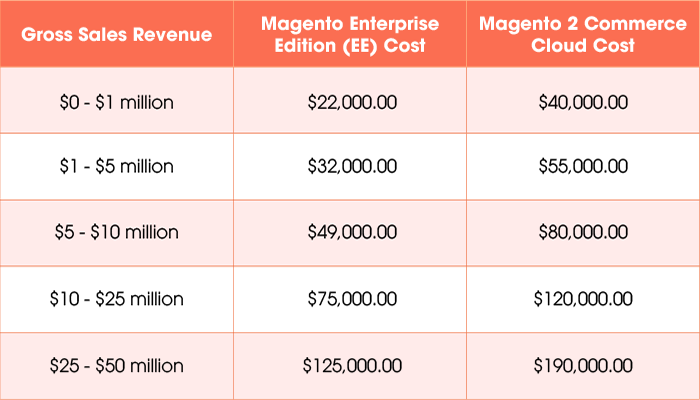
>>> Get prepared with All Must-Know Magento Costs To Build A Basic To Custom Magento Website
Bigcommerce offers 4 levels of pricing plans:
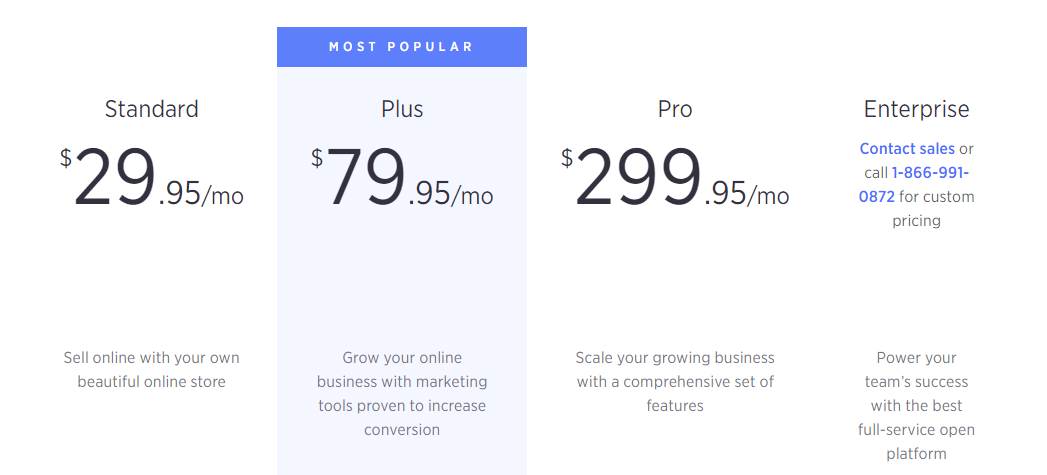
- The Standard Plan supports all the necessary features of an eCommerce website. In this plan, the annual revenue is only permitted up to $50,000.
- The Plus Plan includes all the Standard Plan features and additional features like customer groups and segmentation, a persistent cart, or an abandoned cart saver. The annual revenue is permitted up to $180,000.
- The Pro Plan provides additional features, including Google customer reviews, faceted search (product filtering), and custom SSL. If your revenue surpasses $400,000 per year, you will be charged additional fees (+$150/mo for each additional $200,000 in online sales).
- The Enterprise Plan has custom pricing depending on your sales. It covers everything included in the other plans with extras. Users of this plan can experience priority support from the experts.
The two first plans are suitable for new and emerging businesses, while the others are more suitable for fast-growing and established brands. The processing fee for debit/credit cards starts from 2.9% + $0.30 per transaction, applied to all BigCommerce plans.
As you can see, the cost to set up and run a Magento website can be significantly less costly than a BigCommerce one when calculating the license and transaction fees.
Support
When it comes to the need for support between Magento vs BigCommerce, Magento stands out with a bigger community of users, developers, and Magento partners. Because of its popularity, merchants using this platform can find community support or official support without hassles.
With Magento Community Edition, users can reach out to free and trusted sources like Magento DevDocs, and Magento Help Center to search for available written documents.
-
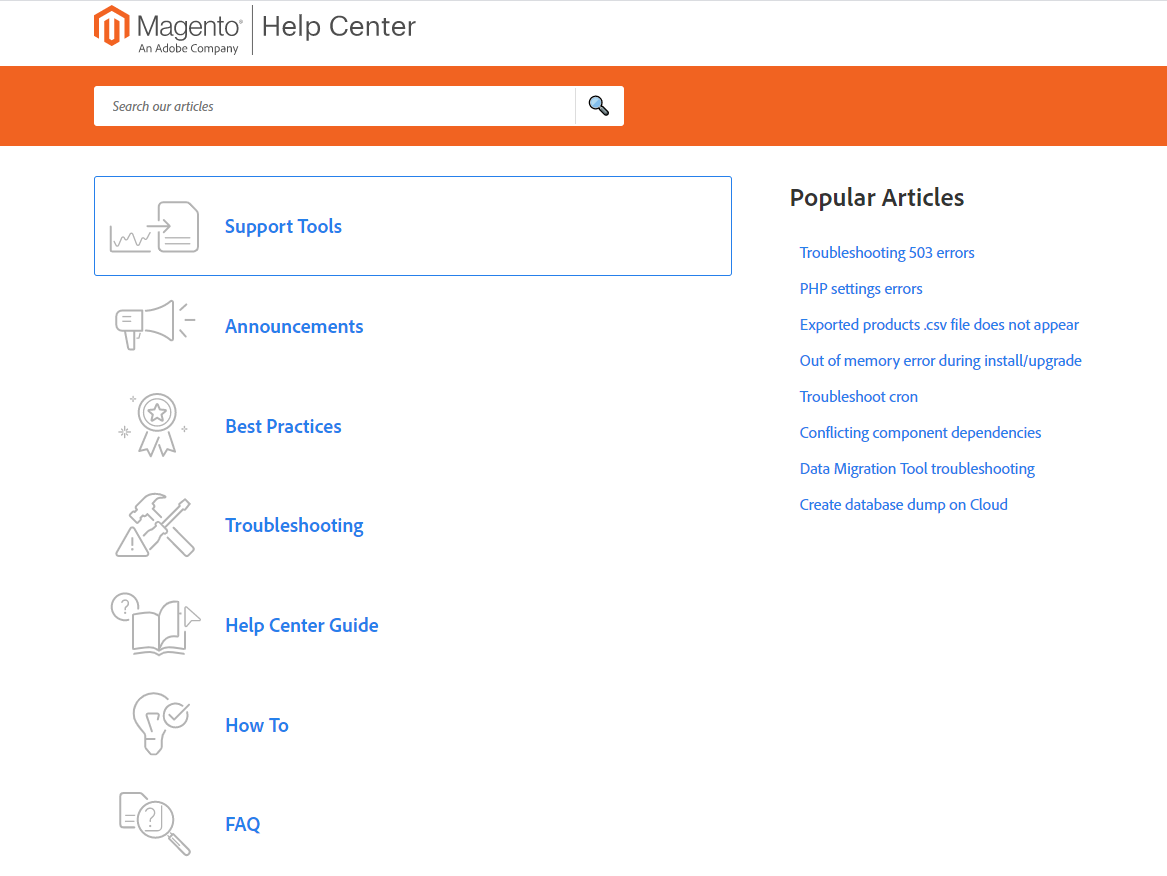
Magento Help Center
-
Another way is to post a question to forums like Magento Stack Exchange or Magento Forums, where many members can share the solutions with you. Especially, Magento Forums has a great number of members, which is over 453.000.
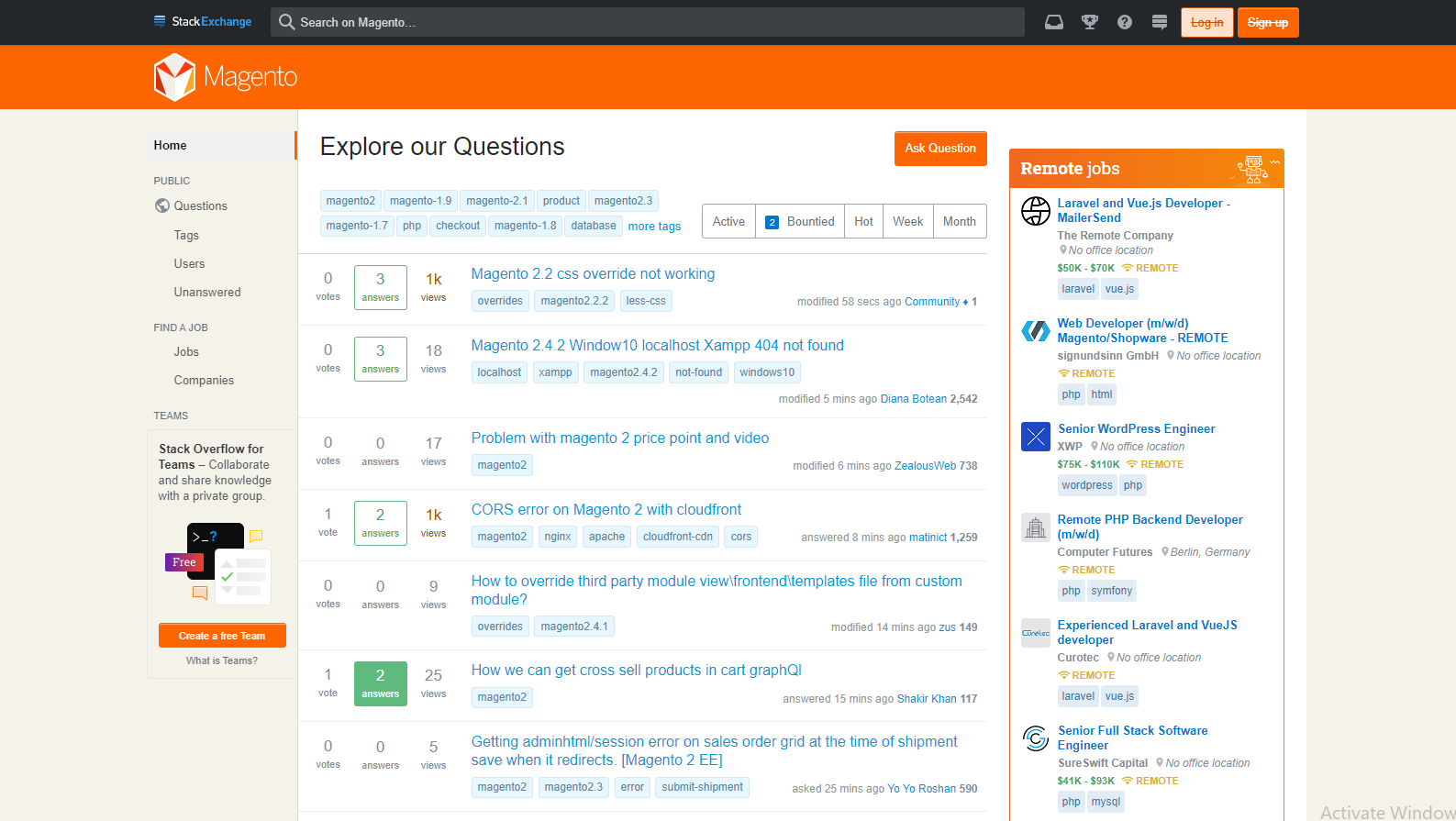
Magento Stack Exchange
Users of Magento Enterprise Edition can experience official support from the Magento team via email or live chat with well-trained support agents.
Like Magento, BigCommerce users also have a choice of BigCommerce Help Center to search for the discussions of concerned topics. Being a paid platform, BigCommerce also offers 24/7 official support via call, email, or live chat with support staff who deeply understand the platform.
Ease of use
Magento is not a beginner-friendly platform because customization requires coding skills and experience. If you are not a coder, this task might be a big challenge for you. However, this is not bad for enterprise-level businesses where sales are big and the administrators are super busy.
They have no way but to hire a dedicated developer/agency with profound knowledge in HTML, CSS, PHP, and JavaScript programming languages to customize their sites. Once the technical aspect is handled by the tech-savvy, managing the business through a user-friendly backend interface will be very simple.
With more than 11 years of serving 150,000+ customers around the world, BSS Commerce is a reliable agency that offers a comprehensive set of exceptional Magento solutions. We are proud to achieve a 90% customer return rate and a 5-star rating on Trustpilot. Please visit our Magento Website Development serviceto launch your dream store today!
Since Magento is written on PHP, the platform is fully customizable according to your needs.
BigCommerce, on the other hand, is much easier for beginners than Magento because people with minimal coding knowledge can easily use it. Another plus of Bigcommerce is that it offers keyboard shortcuts, which allow you to save much time and effort in in-store management from the backend.
BigCommerce is also customizable, but it goes with many restrictions, so customization can cost a pretty penny.
Addons & Extensions
In terms of extension quantity, Magento is the winner.
Magento users can browse Magento Marketplace for thousands of extensions from different 3rd-party providers. This huge store gathers more than 5800 modules in Magento stores in all categories, from Sales, Marketing, Shipping & Fulfillment, Store Optimization, etc. Every extension listed on this marketplace has been reviewed in both code quality and content. Therefore, merchants can be assured when purchasing any extensions from here.
-
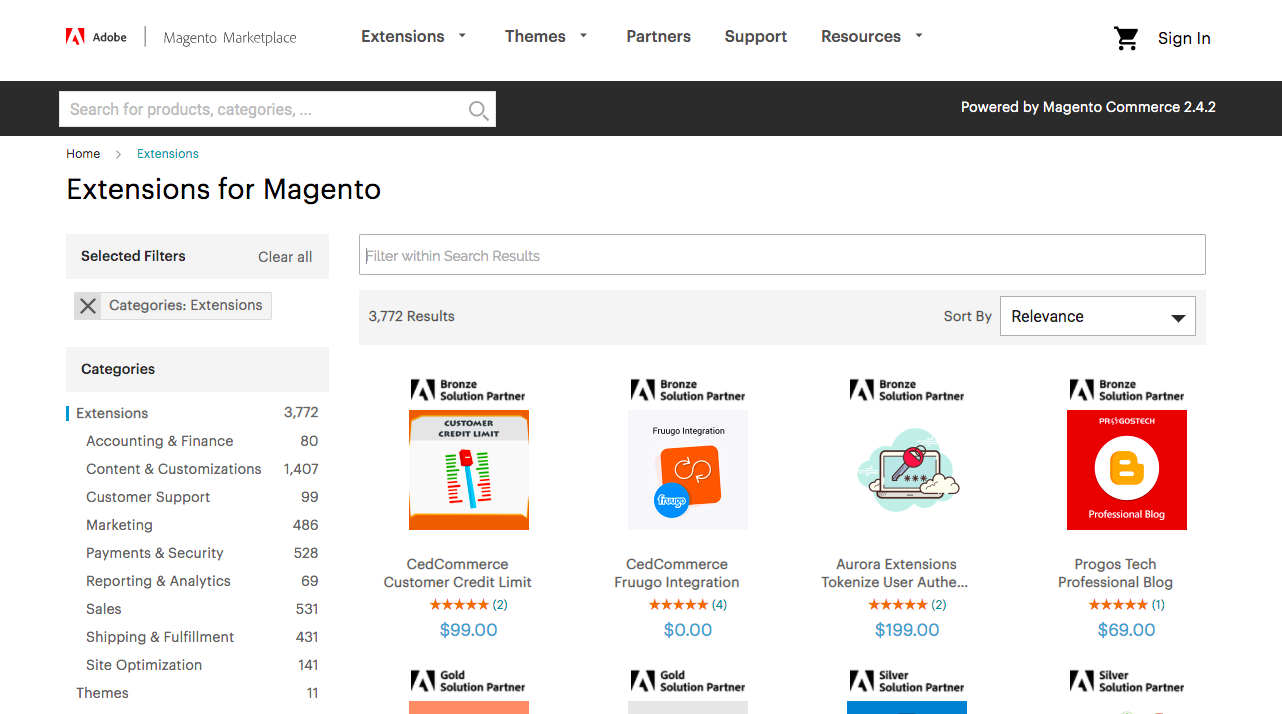
Magento Marketplace
BigCommerce users also have a similar marketplace of extensions. However, it provides over 600 apps only. Extensions here are also divided into different groups such as Marketing, Analytics & Reporting, Payment & Security, etc.
-
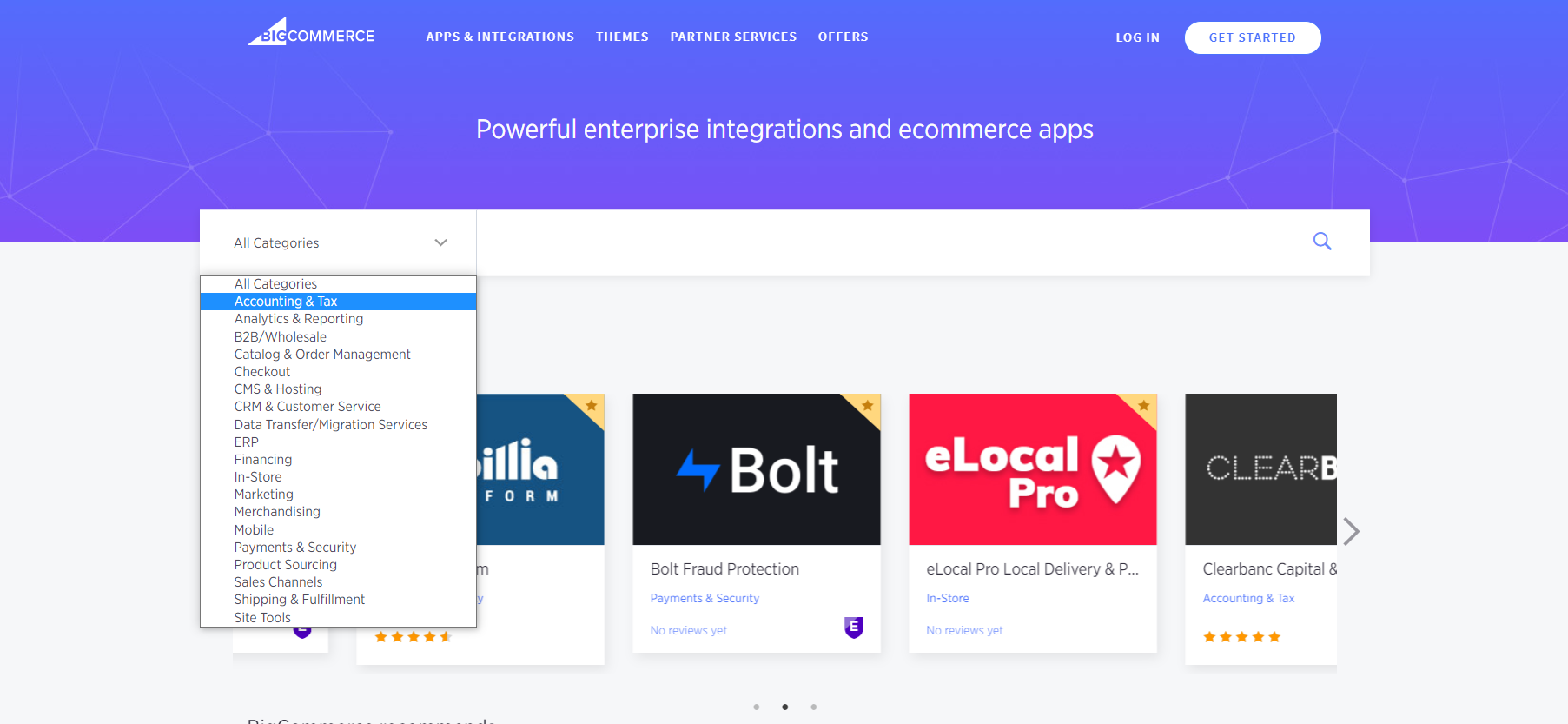
Bigcommerce App Marketplace
Wholesale Capabilities
Are you wondering which platform is better for B2B? Besides the above characteristics, there are some notable differences between Magento 2 and BigCommerce that you need to look for to build a wholesale website for your business.
Compared to BigCommerce, Magento provides the freedom to add features if you have a dedicated development team that is willing to adjust them for you. The Magento 2 platform supports huge catalogs, which are perfect for medium-sized and large corporations.
Not to mention, it also has cross-selling and up-selling features for great wholesale possibilities. Magento’s marketplace is a hundred times larger than BigCommerce’s app store with all kinds of additional B2B functions, both free and paid. You can install the Magento 2 B2B modules through Magento Global Solution Partners like BSS Commerce.
In contrast, BigCommerce focuses on offering as many native B2B features as possible. These features are often optimized for wholesale businesses without large funds for customization, which requires less developer interaction to keep everything running smoothly.
Combined with hosting, pricing, and other characteristics mentioned in the section above, the overall conclusions in terms of wholesale aspect are:
- Magento 2 B2B features are great for big teams with lots of resources that are willing to spend more on customization, maintenance, and optimization. Magento provides solid opportunities for you to make the website meet your specific needs. Since Magento 2 is complicated, your project should consist of a dedicated qualified Magento developer or specialist to ensure the B2B website is working safe and sound.
- On the other hand, BigCommerce is great for a wide range of wholesalers, both small and big B2B businesses. The scalability of BigCommerce is impressive with great optimization of native features as well as a high up-time, which ensures your website works fine without extra touches. The pricing plan can be a bit harsh but it’s enough to ensure the consistency of the services.
>>> DON’T MISS OUT on the Magento alternatives list to widen your choices besides Magento and BigCommerce!
Choose The Right Platform: Magento or BigCommere?
Whatever you choose between Magento vs BigCommerce, it still comes with advantages and disadvantages. The right solution depends on your business needs.
Magento is the right solution for businesses that have the following features: Enterprise-level, global selling, Fast-growing, and Require much customization in design and functionality. On the other hand, BigCommerce will be more suitable for merchants who don’t want to have a dedicated developer to support them with the technical aspects.
For businesses struggling to manage BigCommerce or alternative eCommerce solutions efficiently, BSS Commerce’s specialists and developers can help. They are all certified and have worked on 500+ projects, ensuring to deliver high work quality. Need a consultation for Magento 2 Migration Services to simplify and enhance the online operations experience? Let BSS Commerce help you out!
